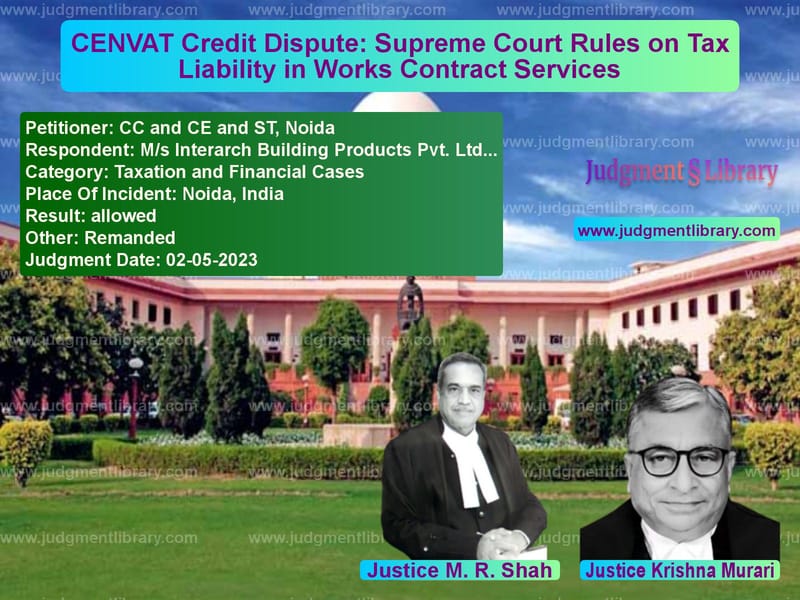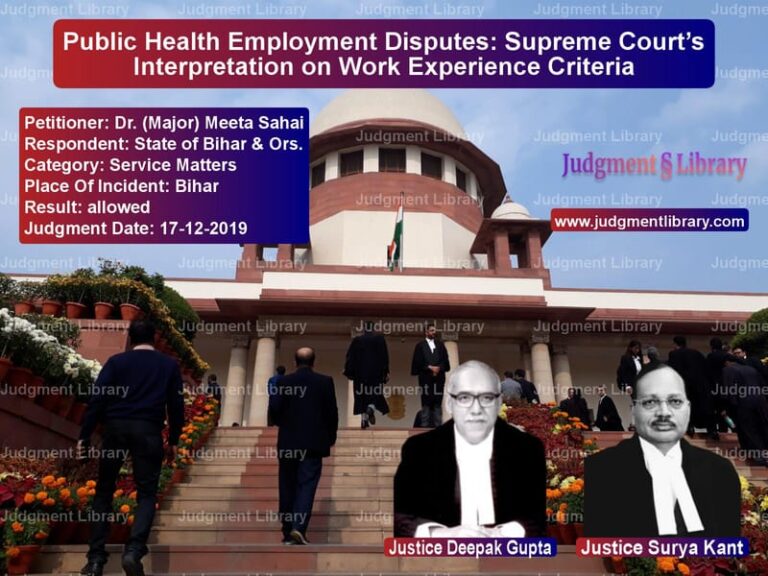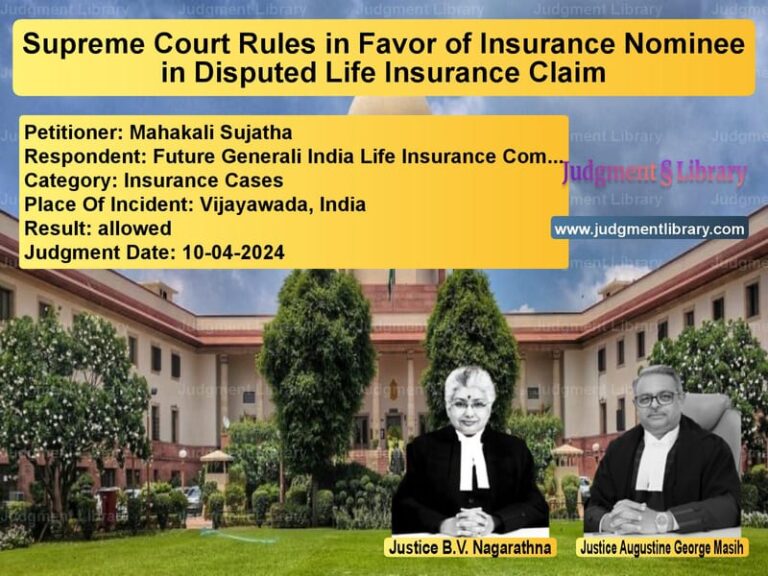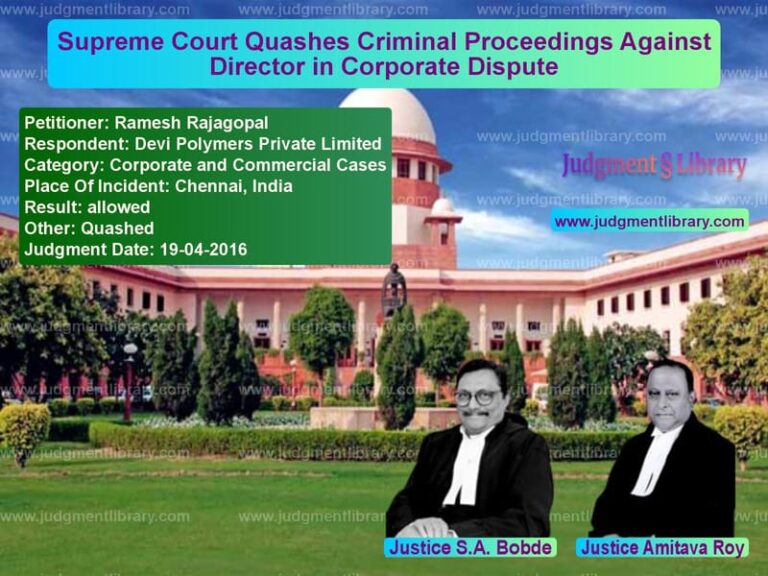CENVAT Credit Dispute: Supreme Court Rules on Tax Liability in Works Contract Services
The case of CC and CE and ST, Noida vs. M/s Interarch Building Products Pvt. Ltd. is a significant ruling on the classification of services and the eligibility of CENVAT credit in works contract services. The Supreme Court analyzed the legal framework under the Finance Act, 1994, and the Service Tax (Determination of Value) Rules, 2006, to determine whether the respondent could avail of CENVAT credit on inputs while discharging service tax liability.
Background of the Case
The dispute arose when the Department alleged that M/s Interarch Building Products Pvt. Ltd. had wrongly classified services under ‘Commercial or Industrial Construction Services’ instead of ‘Works Contract Services.’ The Department contended that the respondent had availed inadmissible CENVAT credit amounting to Rs.1,12,60,92,760 during June 2007 to March 2012, resulting in short payment of service tax.
Read also: https://judgmentlibrary.com/supreme-court-orders-fresh-decision-in-income-tax-settlement-case/
Based on an investigation, the Department issued a Show Cause Notice stating:
- The services should have been classified under ‘Works Contract Services,’ and the respondent should have followed Rule 2A of the Service Tax (Determination of Value) Rules, 2006, or opted for the Composition Scheme.
- By availing of CENVAT credit on inputs, the respondent had allegedly violated tax rules.
- Consequently, a demand of Rs. 22,37,01,811 was raised for short payment of service tax.
The adjudicating authority upheld the Department’s view, leading to an appeal before the Customs, Excise, and Service Tax Appellate Tribunal (CESTAT), which ruled in favor of the respondent. Dissatisfied with the CESTAT’s ruling, the Revenue appealed before the Supreme Court.
Petitioner’s Arguments
The counsel for the Revenue argued:
- The period under dispute was January 2007 to March 2014. Since the definition of ‘Works Contract Service’ was introduced in June 2007, service tax should apply accordingly.
- Under the works contract scheme, the respondent could not avail CENVAT credit on inputs. Rule 2A of the Service Tax (Determination of Value) Rules, 2006, mandates that only the service portion should be taxed.
- The taxpayer had devised an alternate mechanism by paying service tax on the entire contract value, including goods, and simultaneously availing input credit, which is impermissible.
- The Composition Scheme under the Works Contract Rules, 2007, allowed payment of tax at a reduced rate without claiming CENVAT credit on inputs.
Respondent’s Arguments
The respondent countered:
- Rule 2A of the Valuation Rules is subject to Section 67 of the Finance Act, 1994, which allows tax to be computed on the gross amount charged.
- The Composition Scheme was optional, and the respondent was not required to adopt it.
- The Tribunal rightly held that the respondent had the choice to either apply Rule 2A or pay tax on the entire contract value.
Supreme Court’s Observations
The Court extensively analyzed the legal framework and observed:
- Under Rule 2A, the service portion of a works contract should be determined separately from the value of goods involved.
- The respondent’s approach of paying tax on the entire contract value while availing input credit on goods was incorrect.
- The Constitution mandates that sales tax/VAT should apply to the transfer of goods in a works contract, whereas service tax should only be levied on the service portion.
- The CESTAT’s view that Rule 2A is optional and can be disregarded was legally flawed.
Key Judgment Excerpt
The Supreme Court ruled:
“It is held that the assessee is not entitled to take the total contract value which includes both goods and services and remit service tax on the entire value as ‘works contract’ and, in the process, also avail the CENVAT Credit on the entire amount.”
The Court directed that service tax should be computed as per Rule 2A and that the Tribunal should re-examine the issue of the extended period of limitation.
Final Verdict
The Supreme Court quashed the CESTAT order and remanded the matter for recomputation of tax liability under Rule 2A, directing the Tribunal to complete the process within three months.
Petitioner Name: CC and CE and ST, Noida.Respondent Name: M/s Interarch Building Products Pvt. Ltd..Judgment By: Justice M. R. Shah, Justice Krishna Murari.Place Of Incident: Noida, India.Judgment Date: 02-05-2023.
Don’t miss out on the full details! Download the complete judgment in PDF format below and gain valuable insights instantly!
Download Judgment: cc-and-ce-and-st,-no-vs-ms-interarch-buildi-supreme-court-of-india-judgment-dated-02-05-2023.pdf
Directly Download Judgment: Directly download this Judgment
See all petitions in GST Law
See all petitions in Tax Refund Disputes
See all petitions in Banking Regulations
See all petitions in Judgment by Mukeshkumar Rasikbhai Shah
See all petitions in Judgment by Krishna Murari
See all petitions in allowed
See all petitions in Remanded
See all petitions in supreme court of India judgments May 2023
See all petitions in 2023 judgments
See all posts in Taxation and Financial Cases Category
See all allowed petitions in Taxation and Financial Cases Category
See all Dismissed petitions in Taxation and Financial Cases Category
See all partially allowed petitions in Taxation and Financial Cases Category







